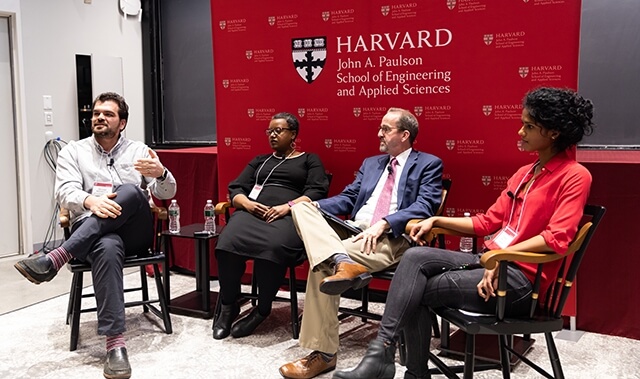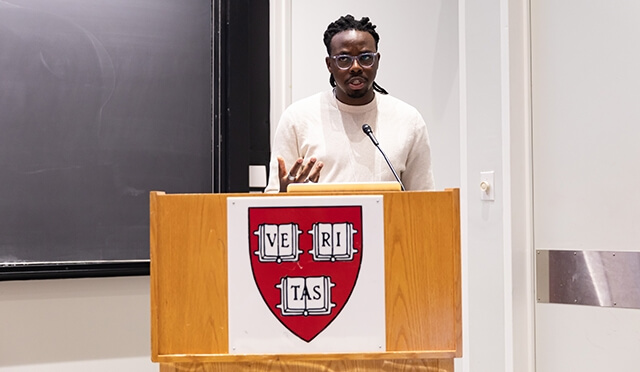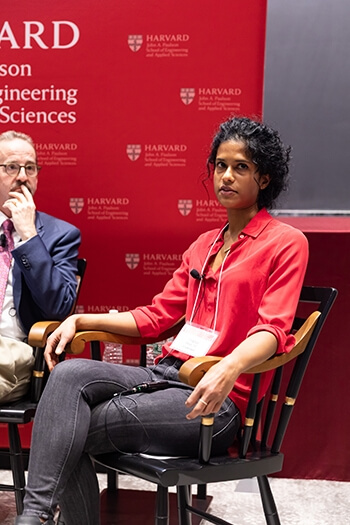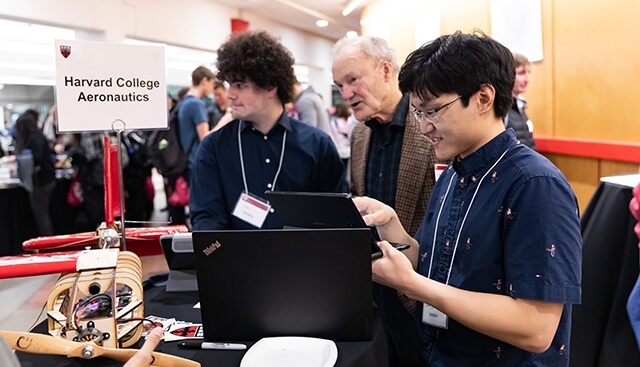News
Sophomore Convocation panelists Michael Mancinelli, S.B. '15, Kharma Foucher, S.B. '96, moderator Dean Frank Doyle, and Trisha Paul, A.B. '13, shared pearls of wisdom with the newest SEAS students. (Photo by Joshua Chiang/SEAS Communications)
Newly-declared concentrators received a warm welcome into the Harvard John A. Paulson School of Engineering and Applied Sciences (SEAS) family during the fourth annual Sophomore Convocation on Feb. 11.
Frank Doyle, John A. Paulson Dean and John A. & Elizabeth S. Armstrong Professor of Engineering & Applied Sciences, kicked off the program by sharing the SEAS mission, vision, and values with the largest and most diverse incoming class in the 13-year history of the school.
Of the 367 sophomore engineering, applied math, and computer science concentrators, 38 percent are women and 18 percent are underrepresented minorities. The national average for engineering schools is 20 percent and 16 percent, respectively.
“At SEAS, we embrace that remarkable diversity,” Doyle said. “But we are not going to rest until we reflect Harvard College, and the broader community.”
In addition to underscoring SEAS focus on diversity, inclusion, and belonging, Doyle shared highlights from the new Science and Engineering Complex in Allston, which will be open for the fall term. Not only will the 500,000-square-foot complex contain research laboratories and classrooms, it will also provide unique, dedicated areas for students and clubs, including a makerspace, garage for car and robotics projects, and even a laboratory for flying drones that is two-and-half stories tall.
The sophomores also got to hear from three seniors about their experiences at SEAS—Grace Zhang, a computer science and statistics concentrator, Billy Koech, an electrical engineering concentrator, and Camille Falezan, an applied math concentrator.
Senior Billy Koech, an electrical engineering concentrator, explains how the opportunity to work on a project in Kenya through Engineers Without Borders was a rewarding and educational experience. (Photo by Joshua Chiang/SEAS Communications)
Zhang emphasized how participating in extracurricular activities, such as the Harvard Computer Society, SummerCamp, and Women in Computer Science, helped her grow and make an impact on the lives of her fellow students.
Koech discussed how international opportunities, including a joint summer program in partnership with the Hong Kong University of Science and Technology and an Engineers Without Borders trip to Kenya, enabled him to bring his classroom lessons into the field in surprising ways.
And Falezan showcased how taking a gap year to work at a startup in Rwanda brought her coursework to life and allowed her to apply those skills to meaningful development economics projects.
Following the student talks, a panel of alumni, moderated by Doyle, spoke of their experiences and shared pearls of wisdom with the new concentrators.
Computer science concentrator Trisha Paul, A.B. ’13, product manager at LogRocket, gives advice about working for a startup. (Photo by Joshua Chiang/SEAS Communications)
Michael Mancinelli, S.B. ’15, an electrical engineering concentrator, encouraged students to seek out the many campus services that can help them find potentially life-changing opportunities, such as internships and research positions.
“There are a ton of resources here that I didn’t take advantage of to the best of my ability,” said Mancinelli, a former lead analyst and systems engineer at Ball Aerospace who is now a Harvard MS/MBA candidate. “I was doing engineering, I was playing football, and I felt like I could do everything on my own. But as soon as I left this environment, I realized how much of a support network there is here.”
Kharma Foucher, S.B. ’96, an engineering sciences – biomedical concentrator, emphasized the importance of making time for things outside the classroom. As an undergraduate, she played cello in a student orchestra.
“That is really what kept me sane,” said Foucher, now an assistant professor in the Department of Kinesiology and Nutrition at the University of Illinois at Chicago. “Playing the cello kept me going through undergrad, grad school, and even the early part of my career. Being in the orchestra gave me leadership opportunities, but it also gave me a chance to use my mind in a different way. I would encourage you to follow your other passions, as well.”
Trisha Paul, A.B. ’13, a computer science concentrator, emphasized the importance of collaboration and communication in the workplace. Employers are seeking individuals with breadth and depth, and Harvard provides a great grounding to help a young engineer develop those soft skills, she said.
Especially for those who plan to work for startups, technical skills can only get you so far.
After the program concluded, new concentrators browsed the many different SEAS student clubs during a reception. (Photo by Joshua Chiang/SEAS Communications)
“You have to be comfortable taking risks and not be afraid to fail,” said Paul, product manager at Boston user experience startup LogRocket. “You can’t get stuck on it—it’s not failure, you’ve just learned something you can apply to your next idea.”
The panelists also encouraged the students to keep open minds and explore unexpected areas as they look to the future.
“There is this notion that you should be born with a passion. I don’t think that’s true for a majority of people,” Mancinelli said. “Test a hypothesis, keep collecting data points, and develop your passion.”
And after successfully navigating what can sometimes be a hyper-competitive Harvard environment, the panelists advised the students to avoid comparing themselves to others.
“There is this intense pressure to be this amazing success right out of the gate, and it is not going to be like that for everyone, and that’s OK,” Foucher said.
Paul echoed that sentiment.
“Think about what your goals are, your goals versus society’s goals, and if what you are doing is making you happy, that is absolutely enough,” she said.
Topics: Academics, Allston Campus, Diversity / Inclusion, Student Organizations
Cutting-edge science delivered direct to your inbox.
Join the Harvard SEAS mailing list.
Press Contact
Adam Zewe | 617-496-5878 | azewe@seas.harvard.edu






